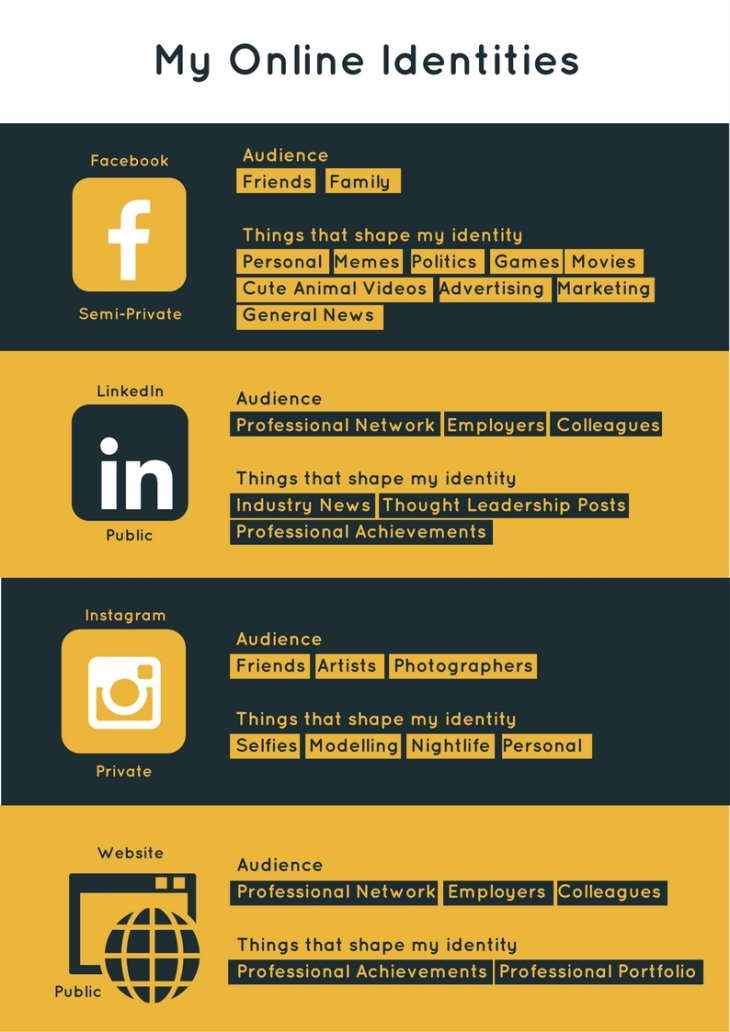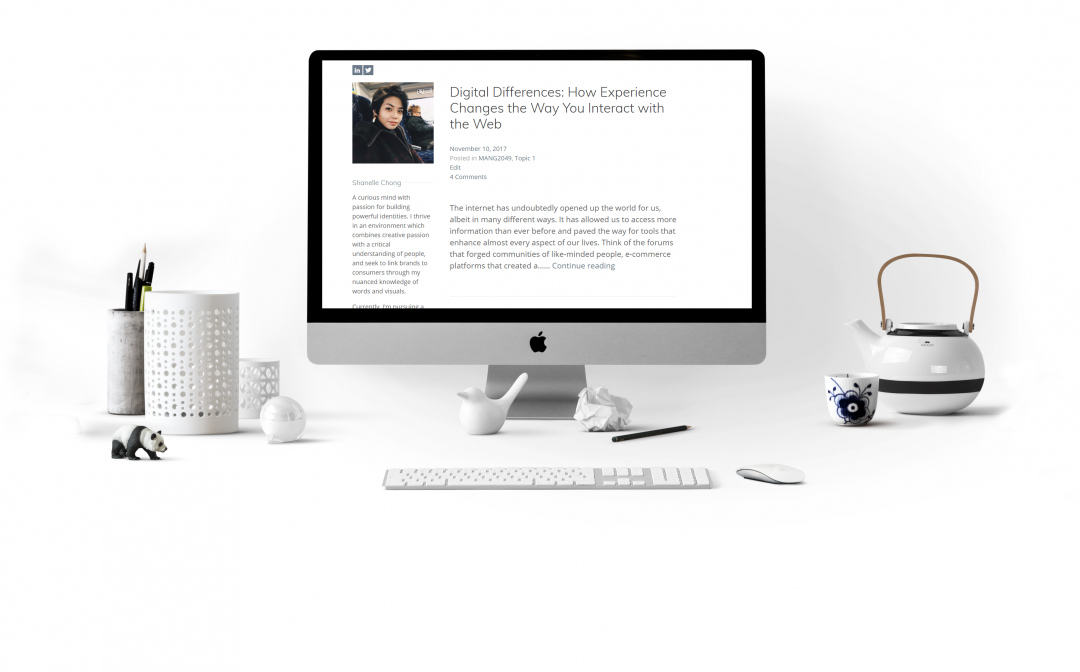The front page of your reputation isn’t your résumé or your social media profiles–it’s what pops up in a Google search.
– Townsend, 2016

Above is a quick Google search of my name in incognito, where you can find my most active profiles — Instagram, LinkedIn, Facebook and my website.
Each profile deliberately paints a slightly different picture of who I am, their differences highlighted in the graphic below.

Source: Original
I have effectively created multiple online identities for myself. Some identities exist beyond the reach of Google. For example, My activities on reddit are anonymous.
My multiple identities were born when I started looking for a job, which called for a need to keep certain things private. 70% of employers screen candidates using their social media (Salm, 2017). The influencer marketing boom showed how powerful online identities can impact people (Agrawal, 2016). More alarmingly, people have been fired as a result of their activities online.
Individuals are multifaceted. Identity is prismatic, and communities like 4Chan exist as a holdover from the interest-driven web.
-Poole, 2012
Some criticise that having multiple online identities is inauthentic and lack the consistency of a single online identity. Facebook and Google incorporate this belief into their model, where your social IDs are tied to your real name and your activities across the platform (Krotoski, 2012).
Arguably, anonymity encourages authenticity by allowing a user to behave without fear of negative social consequences. No doubt, this could result in disruptive and antisocial behaviour, but freedom of expression can cause someone to change their behaviour positively. For example, the anonymous support groups that facilitate conversations with people in distress (Christopherson, 2007).
Humans are naturally inconsistent in their identities. In real life, our extended self is revealed by our material possessions and interactions. Today, our activities and interactions online are also likely to reflect our personality characteristics (Belk, 2016). So ask yourself — do you dress and behave differently with your colleagues and friends?
As we’re often told to keep our professional and personal lives separate, I believe the same for our digital identities. Instead of being conflicts to a “true” self, each digital identity is an expression of yourself, and are part of communities that you choose to reveal yourself to.
Word Count: 317
References
Agrawal, A. (2016). Forbes Welcome. [online] Forbes.com. Available at: https://www.forbes.com/sites/ajagrawal/2016/12/27/why-influencer-marketing-will-explode-in-2017/#78d48b5920a9 [Accessed 20 Nov. 2017].
Belk, R. (2016). Extended self and the digital world. Current Opinion in Psychology, 10, pp.50-54.
Christopherson, K. (2007). The positive and negative implications of anonymity in Internet social interactions: “On the Internet, Nobody Knows You’re a Dog”. Computers in Human Behavior, 23(6), pp.3038-3056.
Krotoski, A. (2017). Online identity: is authenticity or anonymity more important?. [online] the Guardian. Available at: https://www.theguardian.com/technology/2012/apr/19/online-identity-authenticity-anonymity [Accessed 20 Nov. 2017].
LAI, L. (2017). Aussie expat fired after offensive Facebook rant. [online] The Straits Times. Available at: http://www.straitstimes.com/singapore/aussie-expat-fired-after-offensive-facebook-rant [Accessed 20 Nov. 2016].
Salm, L. (2017). 70% of employers are snooping candidates’ social media profiles | CareerBuilder. [online] Careerbuilder.com. Available at: https://www.careerbuilder.com/advice/social-media-survey-2017 [Accessed 20 Nov. 2017].


Hi Shanelle! Love how you managed to do a demo of an online search about yourself. I agree that is important to have a digital presence to market yourself today and at the same time, manage personal accounts carefully. In the same study* by Careerbuilders that you have referenced, it also revealed that 57% of employers are less likely to call a candidate if they cannot find them online! You’ve mentioned that there is a need to keep some of the online identities that you have private. While I agree that privacy and freedom of speech is a human right, do you think this will convey the message to employers that you have something to hide when they search for you online? How would you suggest an approach that can appease both sides? (The employer’s point of view and an individual’s need for privacy and freedom of speech)
(148 words)
Hope to hear from you soon!
-Jerrom
References:
* https://www.careerbuilder.com/advice/social-media-survey-2017
LikeLike
Hi Jerrom, thank you for the comment.
With regards to your question, I do think having no digital footprint would seem unimpressive… particularly in our industry! However, it is natural and a human right to have the ability to withhold personal information. In any case, a solution I can think of to strike a balance with the two is to be more meticulous in your online presence management.
In the google search of myself, it fails to retrieve my other accounts because there are anonymous, private or not as active (barring Instagram, which I’ve only recently made private). You also have the right to remove content you own off Google search results if it’s private. Facebook lets you manage what other people see from you, so you can add your boss and hide content from him/her. Risky though!
For the employer, regularly update your professional profiles with relevant information. This could be things like blogging regularly, typing thought leadership posts on LinkedIn, contributing to medium or having an online portfolio. The more active and useful a page is, the better it ranks on Google search result.
Always be conscious of who might see your online interactions, how permanent they may be (in the case of Instastories and Instagram feed) and what negative consequences may happen.
This way, what is visible of your digital footprint are things that you want people to see.
Remove information on Google:
https://support.google.com/websearch/troubleshooter/3111061?hl=en
LikeLike
Hi Shanelle, love the infographic and I enjoyed the GIF about your active profiles! I agree with your sentiments that “each digital identity is an expression of yourself” and that we chose to reveal a different version of ourselves depending on the context.
I would like to touch upon a point you made about anonymous support groups. Cyber bullying is a growing problem as 52% of young people reported being bullied, with victims suffering from low self-esteem and even considering suicide (Cyber Bullying Statistic, 2017).
It is easy for a troll to sign up for an online support group and post abusive messages to trigger people into relapse. With a lack stability that comes with anonymous support groups, what measure can be done to prevent cyber bullying in this area?
Also, will there be misinformation in anonymous communities as false information is more likely to spread, thus dangerous when it comes to people with serious drug addiction? Would love to hear from you!
(Word count: 157)
Reference:
Cyber Bullying Statistic, 2017. No Bullying: Cyber Bullying Statistic (online). Retrieved from: nobullying.com/cyber-bullying-statistics-2014/
LikeLike
Hey Marianne,
I believe that in such communities, it needs to have a group of dedicated and capable moderators filtering the content that passes through their groups. This also includes keeping an eye out for cyberbullying and fake news.
A recent example of this, Reddit infamously started cracking down on hate groups that encourage undesirable behaviour in 2015 (https://np.reddit.com/r/OutOfTheLoop/comments/39bzdf/why_was_rfatpeoplehate_along_with_several_other/). They are still doing it till today (https://www.theverge.com/2017/10/25/16548958/reddit-ban-nazi-subreddit-violence-policy-change).
LikeLike
Hi Shanelle!
Great job on your post! I’m particularly attracted to your paragraph regarding anonymity. Usually, I associate anonymity negatively, thus your thoughts regarding the positive side of anonymity shed some light into my understanding!
Although I agree that anonymity can have positive effects, but does the positives outweighs the negatives? It was found out in a study that participants who engaged in commenting anonymously tend to be influenced by the tone of other users. For instance, if a cyber-bully uses an aggressive tone on a target, the participant will be likely to do the same as compared to when the less aggressive tone was used. This group norm then affects the mood of the conversation, causing a snowball effect and making it a toxic environment. (http://journals.sagepub.com/doi/abs/10.1177/2056305116664220)
Thus, I feel that even though there are some good in it, the negative impacts are still greater. What do you think?
LikeLike
Hey Nic,
I fully acknowledge the negative side effects of anonymity but it cannot be ignored that there is are groups of people who rely on false identities for safety or privacy. It is difficult to weigh the negatives and positives of anonymity as a whole because the outcomes varies with context (https://www.researchgate.net/publication/221581285_The_Value_of_Anonymity_on_the_Internet). Important things have happened as a result of anonymity. Whistleblowers getting their information to journalists, communication amongst people in countries who are at risk of being killed because of their activities on the internet.
Moreover, the level of anonymity a user can have is subjected to the platform his/her profile is on, e.g Facebook vs. Reddit. A blanket ban on anonymity is unfeasible as it relies on the moderators of the community to enforce it. China attempted to block access to Tor, but people still found a way (http://www.bbc.co.uk/guides/z9j6nbk#zt9qxsg).
To conclude, I feel that it is important to look at the context of anonymity before deciding its impact. On a whole, I think communities that allow anonymity should highly moderate its user generated contents. An interesting article, this is what it’s like to be a reddit moderator! (http://www.businessinsider.com/what-is-a-reddit-moderator-2016-1/?IR=T/#crocker-is-a-graduate-research-assistant-for-the-emerging-media-studies-department-but-a-significant-chunk-of-her-time-is-spent-helping-moderate-the-rscience-subreddit-shes-been-a-moderator-for-over-a-year-and-a-half-now-1)
LikeLike
Hi Shanelle,
Thanks for such a detailed response! 🙂 I’m with you regarding the fact that it is impossible to understand if the positives outweigh the negatives as every interaction is different. Therefore, like you mentioned, it is important to consider the context before deciding the impact.
Do you think that by having such education in schools to be responsible users of the internet may help curb the misuse of online anonymity?
LikeLike